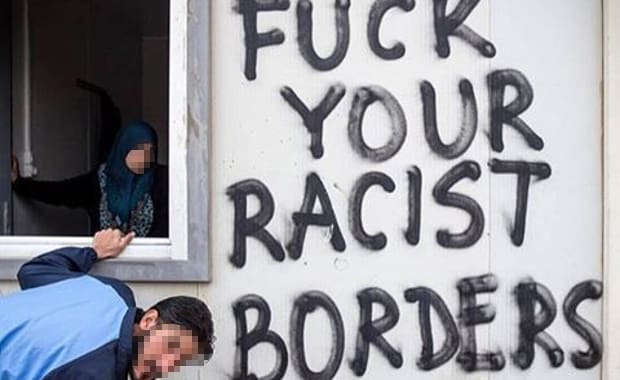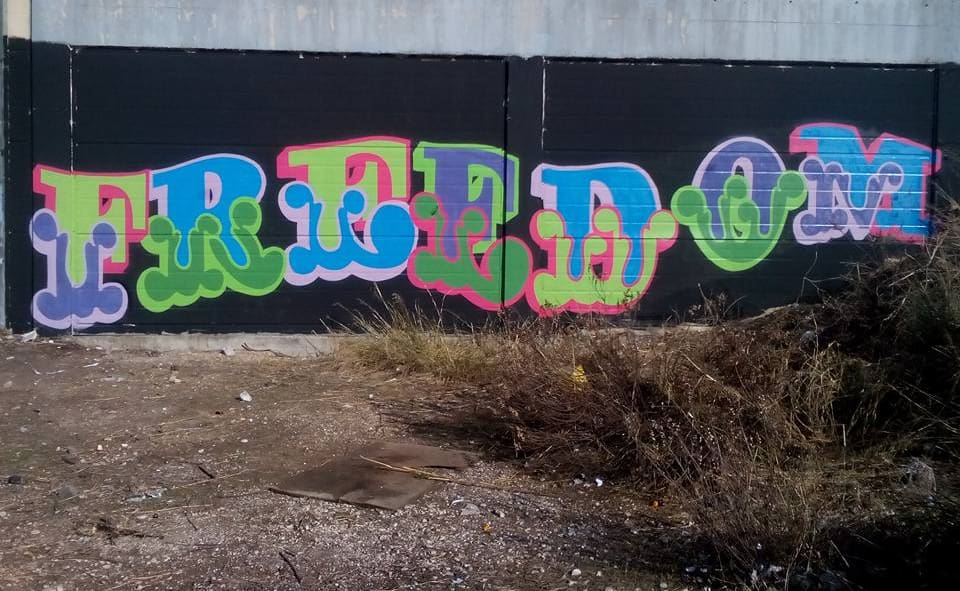Transcribed from This is Hell! Radio‘s 17 May 2014 episode and printed with permission.
This is only an extended excerpt, edited for readability, and does not include the entire range of issues covered in author Melissa Gira Grant‘s interview with host Chuck Mertz; listen to the whole thing here:
“Most people are doing work they don’t feel really great about, and if they had other options would prefer to do something else—but we wouldn’t describe their boss as a pimp. We wouldn’t describe capitalism as their pimp.”
Chuck Mertz: Writer and journalist Melissa Gira Grant is the author of Playing the Whore: the Work of Sex Work. Good morning, Melissa.
Melissa Gira Grant: Hey there, thanks for having me.
CM: Melissa is a contributing editor at Jacobin; her work has also appeared at the Nation, Wired, Atlantic, Glamour, the Guardian, In These Times, Washington Post, Dissent, Slate, Salon, all over the place.
Your book Playing the Whore: the Work of Sex Work challenges the myths about selling sex and those who perpetuate them. You’ve split it into ten chapters whose titles bring you through the whole process: the Police, the Prostitute, the Work, the Debate, the Industry, the Peephole, the Stigma, the Other Women, the Saviors, and the Movement. I think that’s a beautiful way to break it down.
But the thing that disturbs me the most about sex work is the pimp, because a pimp’s cut is 100%. Is that always the case, and how much does that lead to the problems that sex workers deal with every day, as long as it is unregulated and criminal?
MG: First I would ask you what you mean by ‘pimp,’ because one of the things that is consistent across the world, not just in the U.S., is that the group of people who are most in a position to extort things that they want from sex workers through violence or coercion are not people that would be described as pimps—are not even people who we would describe as customers—but actually law enforcement.
And in some cases, law enforcement acts hand in hand with organizations that believe they should use law enforcement to remove sex workers from sex work—to “rescue” them, is how they would talk about it.
So these characters that you see all the time, in what I would characterize as incredibly lazy journalism, described as pimps—the majority of sex workers don’t refer to anybody in their life as a pimp.
The reality is, in a criminalized industry that’s forced underground, people are going to need a third party to place advertisements for them, or to act as security guards to protect them either from law enforcement or from people posing as customers who mean to do them harm. In any other industry that would either be a paid employee you hire to take care of you, or that would be a boss or a manager or an agent.
But because this is criminalized work, that relationship itself is criminalized, and that puts sex workers in a lot of danger. There are some cases where people are described as pimps in the press, but actually functionally they’re coworkers. One of the examples I talk about in the book is a group of women who collectively bought a cell phone in order to use that number to get customers, because they didn’t want to use their personal phones. Makes sense. But whoever has that phone in their name could be construed as facilitating prostitution or promoting prostitution, and that is the kind of offense that’s generally put on somebody they want to charge as a pimp.
So if you see in the newspaper or if you see online that some number of people were “arrested for pimping,” that doesn’t necessarily mean that those people are being violent towards sex workers, or taking a huge amount of their income.
If you want to talk about people taking a huge cut of sex workers’ pay, I would like to see some research on how much sex workers are paying to law enforcement in fines; how much money they are spending bailing themselves out of jail when they are arrested.
CM: How much do you think that the popular image of the MTV rapper pimp undermines or skews our understanding of what sex work is?
MG: I’ve got to be honest, I’m not all that interested in it. I think that’s something that people who don’t do sex work think is the story, and it’s really not. It makes for great copy; it certainly feeds into all kinds of racist and sexist ideas of what sex work looks like. But it’s not the reality.
In New York, researchers at John Jay [College of Criminal Justice] did a study on youth in the sex trade—who we often think of as the sex workers most exposed to violence and danger. They did a really good job of getting a representative sample of young people who are trading sex for what they need to survive in New York; they surveyed a group of youth and then asked them to refer other youth to the program. And less than 10% of youth sex workers in New York reported that somebody was pimping them. In most cases, they were working together, looking out for each other.
I think there are two things about this fascination with the idea that there must be somebody forcing you into sex work. One is the idea that nobody would do sex work unless they had no other choice…but the reality is a lot of people experience their work that way, and we wouldn’t describe their boss as a pimp. We wouldn’t describe capitalism as their pimp. Most people are doing work that they don’t feel really great about, and if they had other options would prefer to do something else. But we exceptionalize it around sex work, and then we create this character that we say is responsible for it.
But there’s also a history, in the United States in particular, going back to the 1880s. There was a national panic around what was called, at the time, “the white slave trade:” white girls being forced by shadowy men—sometimes immigrant men, sometimes black men—into the sex trade, at the same time as the transatlantic slave trade officially ended in the United States.
We might be in the middle of a panic like that again. I think that a lot of the press around human trafficking, around what gets described as sex trafficking, plays on age-old images. And the stereotype of the pimp is a huge part of that.
CM: That’s been the big link lately: the link between sex work and human trafficking. How does that link affect the way in which sex work is seen now?
MG: I notice that pretty much every time the topic of sex work comes up, it quickly goes to this place: “what about pimps, and what about trafficking?” And that is something quite new, within the last ten or fifteen years.
In the eighties, the big issue around sex work was HIV. In the nineties it was the internet—and still HIV. But then, as we get into this century, for whatever reason—and I think there’s a lot of complicated policy reasons for this, as well as cultural and maybe even psychological reasons—the discourse shifts to trafficking.
In some ways it came from the outside. It came from people lobbying the United Nations to take a policy stance against trafficking, and to define any kind of “sexual exploitation” as “trafficking,” which is an incredibly broad term. Sex workers at the time rightly anticipated that sex work itself would be described as trafficking.
And that informed U.S. laws, passed under the first Bush Administration, to further conflate prostitution with trafficking, which in turn empowered local police departments and federal law enforcement to investigate run-of-the-mill prostitution businesses for human trafficking.
“Very rarely do people turn and ask sex workers what they need before they try to set out and provide it to them. They don’t actually trust sex workers to be agents in their own lives.”
This is very dangerous for sex workers. They are increasingly facing more vice enforcement from police—and vice enforcement that’s really beefed up. The people who are most likely to be caught up, the people who are most likely to face prison time and criminal records that could follow them for the rest of their life—which will then make it harder for them to find employment outside the sex industry—are sex workers themselves, not ‘pimps’ or ‘traffickers.’
This concern about ‘human trafficking’ is not really borne out in the numbers of people who are being arrested and incarcerated. When these law enforcement investigations don’t find what they think they’ll find, they just arrest sex workers and try to pressure them into giving them information about who’s forcing them into sex work. In many cases they find that there is no one; what’s “forcing” them into sex work is poverty.
CM: It seems like all of these popular narratives ultimately disempower sex workers. They all seem to have an underlying tone of sexism that I don’t think even today’s feminism notices. You write about how there are groups of today’s feminists who want to save sex workers, who want to help “reform” them. How much do these narratives not only fuel sexism, but disempower sex workers themselves?
MG: There are two frustrating pieces to it. One is what I was referring to when I expressed quite honest frustration with having to talk about trafficking again: it takes all the air out of the room for sex workers. Look at the money that law enforcement has; look at the money that some of these anti-trafficking NGOs have; look at their political allies…sex workers do not have those kinds of resources. So they cannot steer this massive ship around; and we’re missing actual instances of trafficking which happen at far higher rates outside the sex industry.
Second, when I spend time with sex workers’ rights advocates, what they are invested in are issues like housing and health care and discrimination. They aren’t asking for more people to go to jail. They aren’t asking for tougher sentences for “trafficking.”
They aren’t asking for more police on the street, that’s for sure. They don’t trust the police. But some women’s rights organizations are quite invested in this system in which they want to use the police to “rescue” sex workers from sex work, and might say, “oh no, when the police arrest sex workers, they’re not treating them as criminals, they’re treating them as victims.” But you’re still being arrested. You’re still having handcuffs placed on you.
This system couches itself in the language of women’s rights and anti-violence, but they seem to miss the reality that the act of being arrested is violence. Moreover, there are ways in which having more police on the streets actually increases sex workers’ risk of violence: they have even less capacity to negotiate safe sex—and other kinds of safety—with their customers, because they’re fearful of being arrested. And if bad things actually do happen to them, they’re not going to feel like they can call the police and ask for help because the only ways they interact with the police are when the police want to arrest them.
So sex workers aren’t actually trusted to say, “this is what I need.” You have police now colluding with social workers and women’s rights activists—and the Catholic Church—to say, “no, we know what’s best for you.”
I don’t know if they think they are actually helping sex workers. But very rarely do people turn and ask sex workers what they need before they try to set out and provide it to them. They don’t actually trust sex workers to be agents in their own lives.
CM: One of the things you discuss in your book, and one of the things I’ve been hearing a lot about lately is “targeting demand.” It relates to the framework of the War on Drugs—going after the clientele. Going after johns instead of going after sex workers themselves: why isn’t that a solution?
MG: The War on Drugs is a really interesting angle; I’m glad you brought it up. Police departments across the U.S. are finally starting to say that we can’t arrest our way out of this problem, and that what people using drugs need are safe ways to take care of themselves.
It’s a much more pragmatic approach, and it’s what advocates refer to as ‘harm reduction.’ They’re trying to get law enforcement to buy into the idea that you shouldn’t be arresting people—you’re actually creating situations where they’re going to be in much more danger—and what we really should be thinking about is how to save lives. And so you get projects like syringe exchanges and safe injection sites happening in some ad hoc ways in the United States, as John Knefel reported at Buzzfeed this week.
So there is slow, slow movement on the part of law enforcement around drugs, partly thanks to a robust harm reduction movement pushing them that way. And the harm reduction movement around drugs actually crosses over into the sex workers’ rights movement. In harm reduction spaces, I see attention to sex work that I don’t see in other kinds of activist spaces or even social issues spaces. There seems to be an understanding; they totally get it. When you use harm reduction as your way of looking at things, you’re more ready to embrace what sex worker advocates are demanding when it comes to health care and safety and not arresting people in order to “protect them from themselves.” It’s a very interesting alignment.
In some ways, of course, the United States is really, really far behind the rest of the world in embracing harm reduction when it comes to drug use. But I think it’s going to be something that sex workers can really borrow from.
“There is a huge disparity between the leadership of the women’s movement and the vast diversity of women who are supposed to be the beneficiaries of that movement.”
CM: Can we not confront the idea of sex work and the violence that is perpetrated on sex workers by the police, or by anybody—and I know that most of it is by the police—can we not have that discussion as long as we’re not having a more open discussion about sex in the United States?
MG: I think it’s sex and it’s also misogyny. Because the reality is there are lots of men involved in the sex industry who are not the targets of this kind of law enforcement harassment, who are not the targets of this kind of policy panic. This really has to do with women’s sexuality. That, and it’s another place where the mainstream of feminism isn’t necessarily ready to sign up and engage.
I spent a lot of time working in women’s rights organizing and feminist organizing. My last day job, before going freelance as a writer full-time, was working inside an organization called the Third Wave Foundation, now called the Third Wave Fund. They are the only U.S.-based organization that funds grassroots feminist organizing that’s by and for young women of color and queer youth and trans youth. Everybody that they fund is thirty and under. All their projects are led by and for the people that they are meant to serve, which is a very different model.
The fact that this model is the exception is something that makes this a hard conversation to have. Most people who are in positions of power and authority—they might not think of themselves as very powerful or authoritative—but people who are in those positions in women’s rights organizations are probably people who haven’t had experience in sex work, or if they have, they don’t feel that they can talk about it.
And so you get this dance between the people who have had these experiences but can’t talk about it and the people who run the organizations and decide what the projects are going to look like and what they’re going to lobby around.
There’s this fantasy within feminism that there is a universal female experience. Many, many feminists of color before me have pointed out that there is no such thing, that we can’t just say that all issues impact all women in the same way. Organizational leaders may believe they are doing Feminist-God’s work by fighting to end prostitution, but they don’t necessarily have a plan for what happens to sex workers in a feminist utopia.
Unless you’re going to abolish all work, which I think would be a really fascinating feminist project to take up. But it doesn’t seem to be something they’re interested in.
So this is a problem that sex workers face when they’re trying to get women’s rights organizations on board, and that’s a lot of the reason why they don’t go to them. They’ve had more success with labor and health organizations, especially HIV organizations; they’ve had more success with harm reduction, because of these tensions within the women’s movement around sex—but also around power. There is just a huge disparity between the leadership of the movement and the vast diversity of women who are supposed to be the beneficiaries of that movement, who are a far more diverse group of people than the people running these high profile organizations that have power.
CM: One last question for you, Melissa, and it’s our Question from Hell: the question we might hate to ask, you might hate to answer, or our audience will just hate your response.
You write, “this is not a peepshow. So I will not be telling my story, though the means by which I came to the story I am telling here are inseparable from my experience as a sex worker. My job here is to reveal through an exchange of ideas, not through the incitement of arousal—while also not entirely putting aside that I have skin in this game.”
Had you made your book into a peepshow, I bet big publishers and publicity agencies would be clamoring for you, your work, your appearances. So why not just simply chase the dollar and fame, and put all of that salacious stuff in it? Do you think that would be such a distraction from the more salient and important points of the book? Do you think that would just undermine the rest of the book? Why not just go after the money? We live in a capitalist society and, you know, capitalism is our pimp!
MG: I don’t think there’s anything wrong with that, I just think I would have had to approach the book not so much as writing but as sex work. Putting on a character, finding a way to talk about sexual experiences that are gratifying to an audience, finding a way to package and sell them, going out in front of the public and performing that character…I mean, that’s sex work. And to be honest, writing will never pay you as well as sex work will, so why should I bother?
I’m aware that as a writer, part of our job is to sell ourselves, and to appear pleasing and to appear that we are something that ought to be consumed—or our ideas ought to be consumed—and that our individual selves are quite inseparable from our work. I just wanted to dangle that there, as what dominatrixes might call an act of ‘tease and denial,’ and say, “yes, there is this thing going on here in the background, but we’re not going to be talking about that thing. You need to go through this first. You need to confront these realities first. You need to listen to a much more diverse range of sex workers’ experiences and voices than just my own, because my own is just my own.”
I have a different set of tools available to me as a reporter, as a journalist, and as somebody who has been an advocate in sex workers’ communities. I have so much more information I could share with you than what I wore at work and my favorite customer. That’s really the gist of it: my story is just one story; it’s just a drop in the bucket.
At some point I will write that book, and we’ll see how it goes. We’ll see if the riches follow and if I’ll have to amend my words that I made more money in sex work than as a writer. But no one gets into writing for the money. I think it’s difficult to even look at it through that lens.
CM: Melissa, I really appreciate your being on the show. Thanks so much; it really has been a pleasure.
MG: Thank you for having me. It’s been wonderful.





